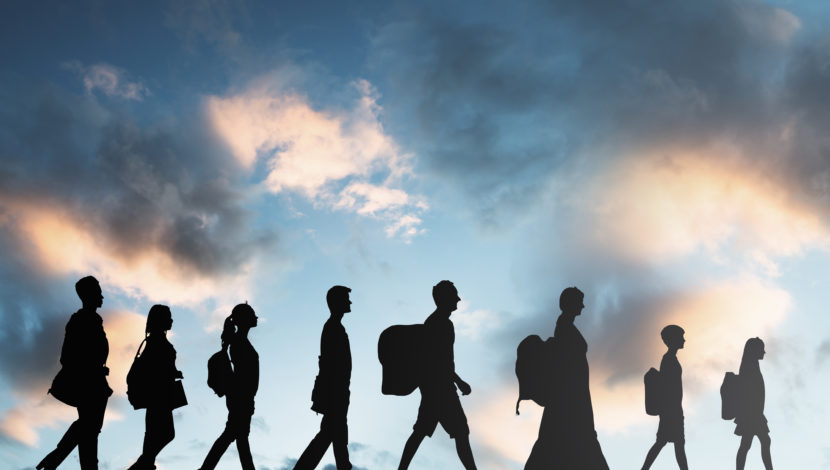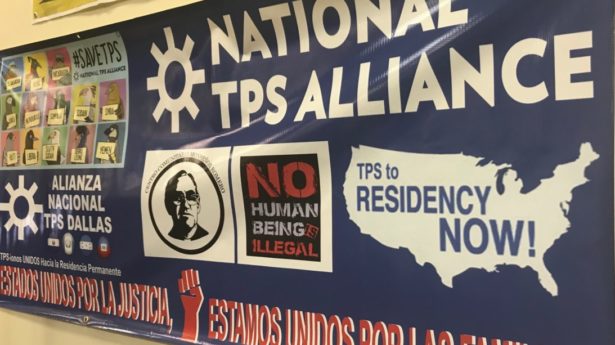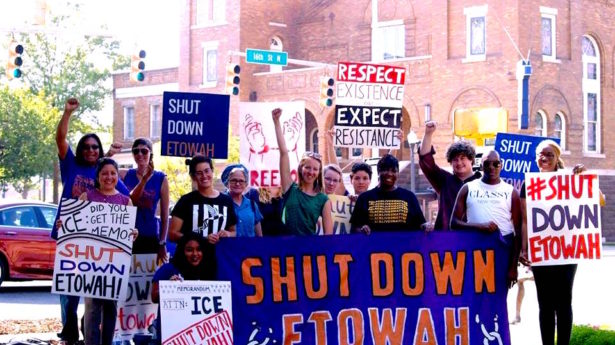The Unitarian Universalist Service Committee advances human rights through grassroots collaborations.
5 Facts About World Refugee Day and Its Connection to Human Rights

By on June 20, 2022
UUSC is an institution with a sincere belief in the human right to migrate. Throughout its 80-year history, UUSC has worked to ensure that people exercising their right to migrate are protected. Whether helping Jews and other religious minorities fleeing Nazi Germany in the 1940s or supporting the thousands of men, women, and children displaced by the genocide in Burma, UUSC’s work provides vital resources for communities that are forcibly displaced.
In 2022, the importance of migration cannot be understated. The genocide in Burma, Russia’s invasion of Ukraine, and the social and political chaos in Haiti have driven thousands of people from their homes and communities in search of stability. And these are just three of any number of conflicts and disasters happening around the world that are also driving forced migration.
Monday, June 20 is World Refugee Day, a time to educate ourselves about refugees and the circumstances that lead to their migration.
Here are five facts about refugees and their connection to human rights:
The Definition of a Refugee Isn’t What You Think
Many may think that a refugee is someone who flees their nation because of a conflict. Well, that’s technically true, but the “conflict” they are fleeing has been defined very narrowly. The United Nations defines a refugee as someone who:
“owing to well-founded fear of being persecuted for reasons of race, religion, nationality, membership of a particular social group or political opinion, is outside the country of his nationality and is unable or, owing to such fear, is unwilling to avail himself of the protection of that country; or who, not having a nationality and being outside the country of his former habitual residence, is unable or, owing to such fear, is unwilling to return to it.”
A gay man fleeing Nigeria for the United States is a refugee. A Rohingya woman fleeing Burma’s genocide is a refugee. A Honduran farmer and his family leaving the nation because of a major drought that has destroyed their crops are not refugees. A Haitian teenager arriving in the United States after losing her entire family in the August 2021 earthquake is not a refugee. The concept of being a refugee—according to the United Nations—is partially rooted in identity. You are not considered a refugee if you are fleeing a civil war, natural disaster, climate change, corruption, or gang violence.
This clearly means that the definition of a refugee is very limited and encompasses few aspects outside of identity—war is the only other criteria used to assess refugee status. When a person flees a nation because of war or persecution, they become a refugee. When they arrive in another country and ask for a formal declaration of refugee status, they become an asylum-seeker.
Labels, at times, can be important. The narrow definition of the word “refugee” by the United Nations does not reflect the real-world problems that are happening right now. There is a deep need to revise this definition to better illustrate the complicated realities that we’re living in around the world.
Climate Change is a Major Driver of Migration
The United Nations estimates that roughly 20 million people have been forcibly displaced due to sea level rise, violent storms, droughts, heavy rainfalls and other climate impacts. As noted above, these people exist in a gray space, forced to leave their homes and communities, but not afforded any international legal rights or courses of action. The 2018 Global Compact on Refugees acknowledges that climate change and environmental degradation “interact with the drivers of refugee movements.” While a small step forward, this acknowledgement does not incorporate an affirmation that those fleeing climate change are in fact refugees. Instead, those in migration because of climate change are referred to as migrants, a broad term used to describe people who have left their homes—temporarily or permanently—but not because of direct violence or persecution.
In fact, a great deal more advocacy is needed to ensure that climate migrants are fully recognized in international laws and mechanisms to best provide support for these populations.
Migration Illuminates Oppression
In early February, when Russia began its invasion of Ukraine, hundreds of thousands of people were displaced and forced to move within the country or to surrounding nations. African, Indian, and Arab students leaving the nation reported incidents of racism as they were denied access to trains and buses leaving the the country. In the United States, Haitian people coming into the country in Texas after the August 2021 earthquake were whipped by Customs and Border Patrol agents on horseback. No substantive disciplinary actions were taken against the agents.
Conflict and chaos often expose injustices deeply embedded in the systems and institutions we rely on. Racism, homophobia, ableism, and a host of other forms of oppression are always unearthed when conflict breeds increased scrutiny. The 2017-2018 Central American caravan that saw thousand of men, women, and children traveling north into Mexico and the United States illuminated rampant racism and xenophobia. The United States’ immigrant detention system was soon revealed for how horribly it was treating Central Americans as media outlets produced numerous reports on family detention and child separation. Upsetting images of children in cages, separated from their families, occupied the media and national discourse for months. Differences between the asylum process for people of color and White migrants became clear.
Injustice is always below the surface of any system or institution that is designed to favor one group of people over another—and there are so many systems and institutions that we depend on.
The United States is Complicit in Many Migration Patterns
The United States has a long—and many times tragic—history when it comes to its relationships with other nations. For example, did you know that from 1912 to 1933, the United States occupied Nicaragua? The purpose for the occupation was to build a large canal and protect American economic interests. Going back to the beginning of the 20th Century, the United States would actively deploy troops to Honduras. The relationship between the two countries have often tied their economic wellbeing with political stability.
These are just two examples of the deeply entrenched relationships between the United States and other countries. Many times, social, political, and economic dynamics within in a nation drive migration, seeing thousands of people migrate north into Mexico and the United States. Yet the United States has never assumed a responsible role in ensuring that Central Americans are welcomed into the country.
The United States occupied Haiti for 19 years beginning in 1915, a move that would cause massive destabilization of the latter nation’s economy. Forced labor became commonplace and the nearly 20-year period saw the United States exploit Haiti as a military and economic resource; Haiti’s wealth was disproportionately stripped away and used to fund American interests. Racism fueled the relationship and though nearly a century has passed, the United States has never truly recompensed the nation for its imperialism.
It’s true that these incidents happened decades ago, but they set a precedent that ultimately caused these nations to depend on the United States. As we see more people immigrating from these nations, it’s vital that we understand our history with these countries and the U.S.’s role in social, political, and economic dynamics that currently exist.
It’s Not Too Late For Us to Change Our Relationship With Refugees
World Refugee Day calls us into a deeper relationship with the immigration process in the United States and beyond. As more and more people come to this nation—despite what they are fleeing from or what they are moving toward—there’s a fundamental obligation we have to ensure that we are helping refugees exercise their human rights. Here are just a few ways you can support this critical work:
- Donate: Donate to UUSC and fund our work to ensure that systems and institutions in the United States and other nations are equitable and uplifting of human rights.
- CAPAS: Learn more about UUSC’s Congregational Accompaniment Project for Asylum-Seekers (CAPAS) and consider asking your congregation to participate.
- Take Action: Visit UUSC’s Virtual Action Center to take a digital action and encourage a U.S. official to take a stance on immigration policies in this nation.
Image Credit: iStock—AndreyPopov

